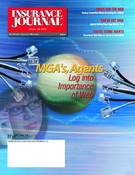TIP 1
To Build “E-Loyalty,” Look To Your Competitors
Here’s what’s really scary: It doesn’t require a lot of resources to build a relationship program on the Web. Therefore, some of your competitors are not only establishing relationship-marketing programs; they frequently build better relationships.
They do so because they are closer to the customer. The small guys know their customers and they focus on what is most important to their customers.
So you might need to stop looking to your biggest competitors for benchmarking your next marketing move, because it’s frequently the “little guys” who really understand the relationships required for e-loyalty. Also, you might want to look at some non-insurance Web sites to get great agency Web site ideas.
TIP 2
The 12 Best Practices of E-mail Relationship Marketing
Intense competitive pressures, combined with easy electronic data flow and low- cost electronic communication, can too easily result in the mishandling of confidential customer data. The following 12 best practices can ensure that you will create a successful marketing culture based on full disclosure, integrity and trust:
1. Develop and post a privacy policy.
2. Guarantee the security of each customer’s personal info.
3. Give customers easy access to their personal info.
4. Account for any customer info that you may already have.
5. Never share customer info without permission.
6. Link today’s questions to tomorrow’s value.
7. Don’t send unsolicited messages.
8. Enable voluntary completion of information.
9. Provide a fast, straightforward unsubscribe procedure.
10. Provide clear message subject lines.
11. Solicit customer feedback.
12. Keep yourself honest.
TIP 3
Make Your Writing More Inviting
The key to creating attractive writing is format. Most readers today don’t want to see a solid block of type. It’s not appealing. Examine your copy to see how you might utilize these four techniques to make your writing more inviting:
• USE “BULLETS.” A bullet is a dot or star or asterisk. You can use them anywhere, anytime, and they will always work.
• USE QUOTES. Readers love quotes. People are interested in people. They want to know what others said.
• USE SMALL PARAGRAPHS. Break up your paragraphs into one or two lines each. Stagger length, to give variety.
• USE BOXES. People read whatever you put in a box (also known in journalism as a “side bar”).
These four techniques, in combination, offer a powerful way to better induce readers to absorb your message. Try it and see the results for yourself!
TIP 4
Testimonials Add Personality to Your Agency’s Advertising
It’s fine for you to tell people your agency is great, but it’s much better when actual customers verify your statements. Ask customers for their comments about your programs and services, and when you get a good comment, ask for permission to use it in your marketing material, and then include it in your brochure, classified ad, Web site, or other online marketing information. Select specific portions of customer comments to appeal to the broadest audience or to pitch the widest array of products or services you offer. Testimonials back up your claims and help make the sale.
TIP 5
10 Point Secret to Successful Internet Marketing
If you are just starting to establish an online presence for your agency, I suggest you print out the following 10-point checklist, to make sure you are on target with regard to fundamentals. If you have already established a presence, you might want to review this list, to make sure you haven’t missed anything:
1. Unique Selling Proposition (USP). Whether online or off, any first-rate agency will clearly and concisely communicate a persuasive USP.
2. Your Own Domain. Anyone who is serious about doing business on the Internet will register and utilize a unique domain (www.yourdomainname.com).
3. Pay attention. Paying attention is gaining knowledge from observing what others have done. This valuable technique, properly implemented, will save you countless hours and thousands of dollars. Successful competitors offer good models.
4. Content. As a general rule, graphics don’t sell; it is words that sell. People surf the Web for information, to solve their problems, and answer their questions.
5. Benefits, Not Features. People care not about features but benefits, which represent the key to effective selling.
6. Simplicity/Convenience. Anything you can do to make your online presence more simple and convenient (including payment systems) will work to your advantage.
7. A high level of automation is the key to successful Internet commerce. Make sure you are using auto-responders to your best advantage.
8. Testing/Tracking. One major beauty of the Internet medium is that testing and tracking can be so fast, easy and inexpensive. To achieve your true potential, you must test and track. And don’t forget the
value of customer feedback.
9. Winning Copy Principles. When writing your copy, keep in mind that: your headline (“the ad for your ad”) is the most important part of the text; “the more you tell, the more you sell”; always ask for the order—and then ask for the order again; create a sense of urgency, a reason to take action immediately; the more generous your guarantee, the more business you will do.
10. Lifetime Value of a Customer. You will only enter the ranks of the super successful when you understand and leverage this key principle.
TIP 6
Reward Customers for Referrals
Mail order music clubs and online services have grown by offering special gifts to customers who refer new customers. You should do the same. Offer a reward—a free car wash, lottery tickets, or fine crystal—to customers who refer new customers. At the very least, they deserve a letter of thanks from the agency owner or president. Satisfied customers are your best marketers, but they’ll work harder for you if they get a tangible reward.
TIP 7
Million-Dollar Advice, From Top E-Marketing Pros:
• “Find other sites online that are good fits for whatever you’re selling, and partner. In the real world, you go to buy a house, and your real-estate agent tells you about a mortgage broker who tells you about an insurance agent who tells you about an inspector. Do this kind of networking on the Net.”
—Dean Alms, chief strategy officer, Groundswell
• “Go through your site as a customer would, to understand trouble spots. Some problems, like faulty links, can be easily avoided once you realize it.”
—John Fomook, vice president of solutions, Xoriant
• “Every time you help a customer, answer his/her question online, it saves you money. Review and update frequently asked questions often, and find places where you can add contextual, even page-specific help, so customers can find the information they need.”
—Jill Frankle, retail e-commerce director, Gomez Advisors
• “No matter what you’re selling, the technical stuff that makes an e-commerce site run is the same. Outsource it all, so you can fine-tune the business side.”
—Jamie Lerner, CEO, Xuma
• “The Web makes it easier than ever to check the competition, to make sure there’s some special twist to what you’re doing that gives you an edge. You constantly have to dig around on other companies’ sites, and maybe even request a quote, to keep up.”
—Jack Fries, Fries & Fries Consulting
TIP 8
E-mail: Timing Is Very Important
The content of your marketing e-mail is of course what is most important. Beyond that, though, how might you give your message an edge, in terms of when you send it (presuming you have a choice)?
The current consensus seems to be that e-mail that is sent out around midnight on Monday (the recipient’s time) tends to get more attention than at other times. Tuesday morning is the most likely time that someone will address reading his or her e-mail.
Monday, people tend to be overwhelmed with what’s in their in-boxes. By Tuesday they tend to be thinking more about the future. The same general principles apply to time of day. The first thing Tuesday morning is about “as good as it gets,” to borrow a title from a popular movie. So it might be worth your while to try sending important messages around this time (in the absence of any good reason for not doing so).
As with all marketing tactics, the key is: test, test, test. You’ll never know until you try.
TIP 9
Build Visitor Goodwill with Helpful Ideas:
Life becomes more complex as technology puts demands on everyone’s time. That can represent an excellent opportunity for the smart agency Web site publisher.
A service that can garner huge results can be as simple as offering industry reminders, updates and generally helpful information.
Keep a close eye on changes occurring in our industry. Create a “Customer Information” page on your Web site and keep it packed with FREE information that will help protect your customers from financial loss.
Let your visitors register to be kept up to date with information, which will interest them. When a new event is discovered that fits their interests, send them an e- mail update to let them know about it.
This service means your e-mail will always be welcome in their in-box.
TIP 10
Checked Your E-Mail Signatures Lately?
You don’t see your outgoing e-mail signature in many programs, and out of sight often means out of mind. Check your signature today and make sure it’s still correct and that it conveys the right marketing message. It’s all too common for people to forget about an old signature and find that they’ve been broadcasting an old address or phone number for weeks. And be sure to check all your e-mail signatures: on every computer you use.
Jack Fries has over 36 years of experience with both companies and insurance agencies. His career includes time spent as a personal lines’ underwriter, a commercial lines underwriter, and as the administrative head of a branch office property/casualty operation. As a principal in three insurance agencies, Fries held the positions of Operations Manager, Sales Manager, Marketing Manager, and CEO. In 1986 he left the agency ranks to establish Automation Techniques. In 1988 he established Fries & Fries Consulting, an automation, sales and management consulting firm aimed at improving agency profitability and customer service. Fries is currently helping agencies implement electronic filing, a truly paperless environment using their existing agency management systems. In 1993, he created CIMA, a $40 million dollar marketing cluster, based in the Bay area. In 1997 he accepted a temporary position of President and CEO of an insurance agency in Morgantown, West Virginia with three locations, while still performing regular speaking engagements. He currently performs speaking, and agency/company consulting and expert witness work, and presents seminars on agency planning, marketing, sales, automation and risk management.
Topics Agencies
Was this article valuable?
Here are more articles you may enjoy.


 Beazley Agrees to Zurich’s Sweetened £8 Billion Takeover Bid
Beazley Agrees to Zurich’s Sweetened £8 Billion Takeover Bid  Charges Dropped Against ‘Poster Boy’ Florida Contractor Accused of Insurance Fraud
Charges Dropped Against ‘Poster Boy’ Florida Contractor Accused of Insurance Fraud  Longtime Alabama Dentist Charged With Insurance Fraud in 2025 Office Explosion
Longtime Alabama Dentist Charged With Insurance Fraud in 2025 Office Explosion  Allstate CEO Wilson Takes on Affordability Issue During Earnings Call
Allstate CEO Wilson Takes on Affordability Issue During Earnings Call 


